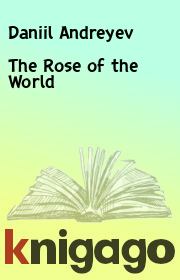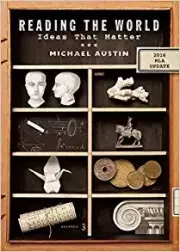Daniil Andreyev - The Rose of the World
 | Название: | The Rose of the World |
Автор: | Daniil Andreyev | |
Жанр: | Старинная литература | |
Изадано в серии: | неизвестно | |
Издательство: | неизвестно | |
Год издания: | - | |
ISBN: | неизвестно | |
Отзывы: | Комментировать | |
Рейтинг: | ||
Поделись книгой с друзьями! Помощь сайту: донат на оплату сервера | ||
Краткое содержание книги "The Rose of the World"
This book was begun at a time when the threat of an unparalleled disaster hung over the heads of humanity-when a generation only just recuperating from the trauma of the Second World War discovered to its horror that a strange darkness, the portent of a war even more catastrophic and devastating than the last, was already gathering and thickening on the horizon. I began this book in the darkest years of a dictatorship that tyrannized two hundred million people. I began writing it in a prison designated as a «political isolation ward.» I wrote it in secret. I hid the manuscript, and the forces of good-humans and otherwise-concealed it for me during searches. Yet every day I expected the manuscript to be confiscated and destroyed, just as my previous work-work to which I had given ten years of my life and for which I had been consigned to the political isolation ward-had been destroyed.
Читаем онлайн "The Rose of the World". [Страница - 3]
- 1
- 2
- 3
- 4
- 5
- . . .
- последняя (100) »
Bitter experience has already led humanity to the conviction that neither those socioeconomic movements guided solely by reason nor scientific progress in itself are capable of guiding humanity between the Charybdis of dictatorship and the Scylla of world war. On the contrary, new socioeconomic systems, in coming to power, themselves adopt the practices of political despotism and become the sowers and instigators of world war. Science becomes their lackey, far more obedient and reliable than the church was for the feudal barons. The root of the tragedy lies in the fact that the scientific professions were not from the very beginning coupled with a deeply formulated moral education. Regardless of their level of moral development, everyone is admitted into those professions. It should come as no surprise today that one side of every scientific and technical advance goes against the genuine interests of humanity. The internal combustion engine, radio, aviation, atomic energy - they all strike the bare flesh of the world's people with one end, while advances in communications and technology enable police states to establish surveillance over the private life and thoughts of each person, thus laying an iron foundation for life-sucking dictatorial states.
So, lessons drawn from history should lead humanity to realize that the dangers will not be averted and social harmony will not be achieved by scientific and technological progress alone. Nor shall it be accomplished by the hypertrophy of the state, by the dictatorship of a "strong leader," or by social democratic administrations that get buffeted by the winds of history, first right, then left, from inept starry-eyed idealism to revolutionary extremism. We must, rather, recognize the absolute necessity of the one and only path: the establishment, over a global federation of states, of an unsullied, incorruptible, highly respected body, a moral body standing outside of and above the state. For the state is, by its very nature, amoral.
What idea, what teaching will aid in the creation of such a supervisory body? What minds will formulate its guiding principles and make it acceptable to the overwhelming majority of people? By what paths will such a body-a body foreswearing the use of force-arrive at worldwide recognition, at a position even higher than a federation of states? If it can in fact introduce into leadership the policy of gradually replacing coercion with something else, then what would that something else be? And in what manner would it be introduced? And what doctrine would be able to solve the incredibly complex problems that will arise in connection with all that?
The present book attempts to give, to some extent, an answer to the above questions (although it shall also deal with wider issues). As a prologue to answering them, however, it is best to first clearly identify what this teaching sees as the irreconcilable enemy against which it is directed.
From the historical point of view, it sees its enemies in all states, parties, or doctrines that strive to enslave others and to establish any form of despotic political regime. From the metahistorical point of view, it has but a single foe: the Antigod, the Spirit of Tyranny, the Great Torturer, who takes many shapes and forms in the life of our planet. For the movement I am now talking about-both now, when it has barely begun to form, and later, when it will have become the decisive voice in history- there will be only one enemy: tyranny and coercion wherever it may arise, even within itself. Coercion will be admissible only in cases of absolute necessity, only in mitigated forms, and only until that time when the highest body, by means of a reformed educational system, has, with the help of millions of highly committed minds and wills, prepared humanity for the substitution of free will for force, the voice of deep-felt conscience for the decrees of human laws, and a community for the state. In other words, until the very essence of the state has been transformed and a living family of all peoples has replaced the soulless and coercive state apparatus.
One need not assume that such a process will require an enormous span of time. By systematically immersing the populations of huge countries in a single meticulously formulated system of education and social conditioning, powerful dictatorships have irrefutably proven what a powerful lever the molding of a generation's psyche can be. Each generation formed closer and closer to what the ruling powers considered desirable. Nazi Germany, for example, managed to achieve its goals in this area in the span of a single generation. Clearly its ideals can elicit no response in us other than anger and disgust. Its methods, as well, must be rejected almost wholesale. But we must take hold of the lever it discovered and not let go. The century of mass spiritual enlightenment, the century of decisive victories for a new, as yet barely discernible pedagogy is approaching. Even if only a few dozen schools are organized on its principles, a generation capable of doing its duty out of free will, not coercion, a generation acting out of creative impulses and love, not fear, would form there. That is the essence of ennobling education.
I picture an international organization, both political and cultural in nature, setting as its aim the transformation of the state through the consistent implementation of far-reaching reforms. The crucial stage in the fulfillment of that aim will be the founding of the Global Federation of Independent States. But this must carry the proviso that a special body be established over the Federation - the body I have already mentioned, which will oversee the activities of the states and guide them toward a bloodless and painless transformation from within. The key here is "bloodless and painless," for in that way it will differ from revolutionary doctrines of the past.
I consider it both premature and unnecessary to speculate on the structure and name of that organization. For now, so as to avoid constantly repeating a lengthy description, we will give it a provisional name: the League for the Transformation of the State. As for its structure, those who will be its founders will be both more experienced and more practical than I-they will be leaders of vision, not poets. I will only say that it seems to me personally that the League should establish branches in every country, with each branch consisting of several divisions: cultural, philanthropic, educational, and political. The political division in each country will assume the structural and organizational aspects of a national party of global religious and cultural reforms. All such parties will be linked and united in the League and by the League.
How,
--">- 1
- 2
- 3
- 4
- 5
- . . .
- последняя (100) »
Книги схожие с «The Rose of the World» по жанру, серии, автору или названию:
 |
| Michael Austin - Reading the World: Ideas That Matter Жанр: Старинная литература Год издания: 2015 |





